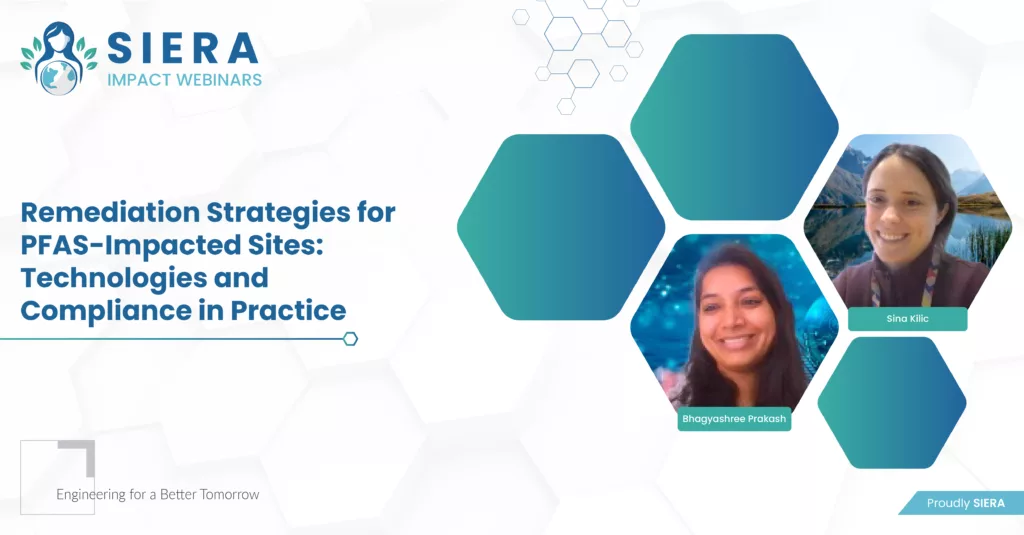Introduction
Per- and polyfluoroalkyl substances (PFAS)—often called “forever chemicals”—represent one of the most pressing environmental challenges of our time. Their extreme persistence and resistance to natural degradation make them particularly difficult to manage, with contamination spreading across soil, water, and food chains in Europe and beyond.
In a recent SIERA Impact Webinar, experts of the SIERA Alliance explored how businesses, regulators, and innovators can respond with effective strategies that not only mitigate risks but also create new opportunities for sustainable growth.
Why PFAS Remediation Matters
PFAS contamination poses risks that extend far beyond the technical domain of environmental engineering:
- Human health: Exposure is linked to cancer, endocrine disruption, and neurological harm.
- Ecosystem impacts: Contamination disrupts biodiversity, damages soil health, and contaminates water systems.
- Economic consequences: Cleanup costs in Europe could escalate into the billions if remediation is delayed, creating legal and reputational risks for industries.
Proactive remediation helps safeguard communities, reduce liability, and unlock the potential for land reuse aligned with the EU’s circular economy and Green Deal objectives.
The Challenges Ahead
Experts identified four major challenges that make PFAS remediation particularly complex:
- Persistence and scale – PFAS remain in the environment for decades, steadily accumulating across ecosystems.
- Detection and monitoring gaps – Current monitoring programs track only a fraction of PFAS types, creating blind spots.
- Treatment complexities – Advanced solutions such as reverse osmosis, nanofiltration, or plasma treatment are technically demanding, costly, and can generate waste streams that require careful handling.
- Regulatory fragmentation – Different countries apply different thresholds and timelines, slowing progress and weakening enforcement.
A Changing Regulatory Landscape
Despite fragmented policies, the EU is taking decisive steps toward stronger PFAS regulation:
- Water Framework Directive & Drinking Water Directive – setting maximum allowable PFAS levels.
- Environmental Liability Directive – enforcing the “polluter pays” principle.
- REACH regulation & POPs directive – restricting or banning production and use of hazardous PFAS compounds.
Harmonized standards are key to accelerating action, providing certainty for businesses, and fostering innovation in PFAS-free alternatives.
Opportunities for Innovation and Growth
What may seem like a liability is also a catalyst for positive change. The webinar highlighted several opportunities:
- Advanced monitoring: Smarter detection and risk mapping to prevent contamination before it spreads.
- Technology innovation: Integration of multiple treatment methods (“treatment trains”) to capture and destroy PFAS effectively.
- Ecosystem restoration: Safely remediated land can be repurposed for housing, industry, or green infrastructure.
- Compliance-driven resilience: Businesses that act early reduce costs, strengthen trust, and gain access to green financing opportunities.
From Challenge to Action
The message from the webinar was clear: PFAS contamination cannot be solved by one solution or stakeholder alone. It requires:
- Collaboration between regulators, industries, and innovators
- Investment in monitoring, technology, and compliance systems
- Commitment to long-term remediation and transparent reporting
By taking decisive action now, businesses and governments can not only mitigate environmental and health risks but also contribute to a future that is cleaner, safer, and more resilient.
Explore What’s Next
The PFAS discussion is just one part of the SIERA Impact Webinar Series, which delivers actionable knowledge on critical ESG and compliance challenges.
📅 Explore upcoming sessions on water, biodiversity, circular economy, sustainable infrastructure, and more: https://siera-alliance.com/event-calendar/ Together, we can turn today’s environmental challenges into opportunities for innovation and long-term value—always true to our mission of Engineering for a Better Tomorrow.












